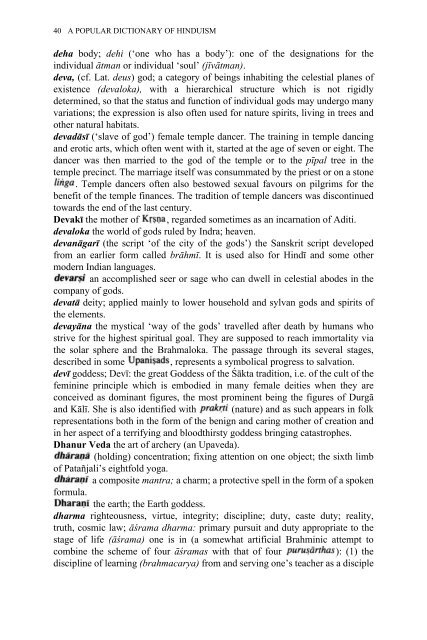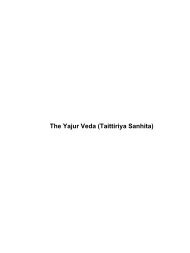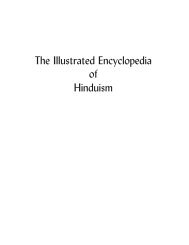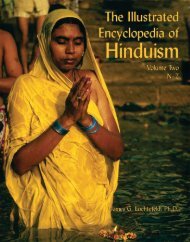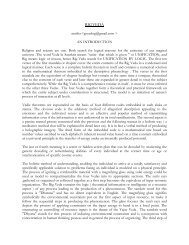You also want an ePaper? Increase the reach of your titles
YUMPU automatically turns print PDFs into web optimized ePapers that Google loves.
40 A POPULAR DICTIONARY OF HINDUISM<br />
deha body; dehi (‘one who has a body’): one <strong>of</strong> the designations for the<br />
individual ātman or individual ‘soul’ (jīvātman).<br />
deva, (cf. Lat. deus) god; a category <strong>of</strong> beings inhabiting the celestial planes <strong>of</strong><br />
existence (devaloka), with a hierarchical structure which is not rigidly<br />
determined, so that the status and function <strong>of</strong> individual gods may undergo many<br />
variations; the expression is also <strong>of</strong>ten used for nature spirits, living in trees and<br />
other natural habitats.<br />
devadāsī (‘slave <strong>of</strong> god’) female temple dancer. The training in temple dancing<br />
and erotic arts, which <strong>of</strong>ten went with it, started at the age <strong>of</strong> seven or eight. The<br />
dancer was then married to the god <strong>of</strong> the temple or to the pīpal tree in the<br />
temple precinct. The marriage itself was consummated by the priest or on a stone<br />
. Temple dancers <strong>of</strong>ten also bestowed sexual favours on pilgrims for the<br />
benefit <strong>of</strong> the temple finances. The tradition <strong>of</strong> temple dancers was discontinued<br />
towards the end <strong>of</strong> the last century.<br />
Devakī the mother <strong>of</strong> , regarded sometimes as an incarnation <strong>of</strong> Aditi.<br />
devaloka the world <strong>of</strong> gods ruled by Indra; heaven.<br />
devanāgarī (the script ‘<strong>of</strong> the city <strong>of</strong> the gods’) the Sanskrit script developed<br />
from an earlier form called brāhmī. It is used also for Hindī and some other<br />
modern Indian languages.<br />
an accomplished seer or sage who can dwell in celestial abodes in the<br />
company <strong>of</strong> gods.<br />
devatā deity; applied mainly to lower household and sylvan gods and spirits <strong>of</strong><br />
the elements.<br />
devayāna the mystical ‘way <strong>of</strong> the gods’ travelled after death by humans who<br />
strive for the highest spiritual goal. They are supposed to reach immortality via<br />
the solar sphere and the Brahmaloka. The passage through its several stages,<br />
described in some , represents a symbolical progress to salvation.<br />
devī goddess; Devī: the great Goddess <strong>of</strong> the Śākta tradition, i.e. <strong>of</strong> the cult <strong>of</strong> the<br />
feminine principle which is embodied in many female deities when they are<br />
conceived as dominant figures, the most prominent being the figures <strong>of</strong> Durgā<br />
and Kālī. She is also identified with (nature) and as such appears in folk<br />
representations both in the form <strong>of</strong> the benign and caring mother <strong>of</strong> creation and<br />
in her aspect <strong>of</strong> a terrifying and bloodthirsty goddess bringing catastrophes.<br />
Dhanur Veda the art <strong>of</strong> archery (an Upaveda).<br />
(holding) concentration; fixing attention on one object; the sixth limb<br />
<strong>of</strong> Patañjali’s eightfold yoga.<br />
a composite mantra; a charm; a protective spell in the form <strong>of</strong> a spoken<br />
formula.<br />
the earth; the Earth goddess.<br />
dharma righteousness, virtue, integrity; discipline; duty, caste duty; reality,<br />
truth, cosmic law; āśrama dharma: primary pursuit and duty appropriate to the<br />
stage <strong>of</strong> life (āśrama) one is in (a somewhat artificial Brahminic attempt to<br />
combine the scheme <strong>of</strong> four āśramas with that <strong>of</strong> four<br />
): (1) the<br />
discipline <strong>of</strong> learning (brahmacarya) from and serving one’s teacher as a disciple


